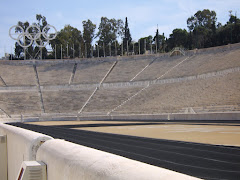


My employer, Edelman, offers some nice perks in appreciation of longtime employees. For one's 10th anniversary with the company, for example, a three-week paid sabbatical/holiday is bestowed. It sure was nice to hit the "official" anniversary earlier this year, and start with a blank slate for potential destinations for a holiday.
While beach time was on my mind, the No. 1 priority -- travel wise -- was easy to name: Munich. This is the city where, as they say, "it all began" for me, possibly in a literal sense as my parents were honeymooning in the 1972 Olympic City just before the Games, and I arrived on the scene nine months later (May 1973).
That's right ... I may be a Munich Olympic baby.
Since my high school days, and looking closely at some of my parents' photos from their own European adventure (including snapshots from their visit to the Olympic Tower in Munich), I had planned, and postponed, and planned again (and delayed ... again, several times repeated) trips to Bavaria. For the sabbatical, it seemed fitting to finally make it there.
Munich is amazing. I'll work to write about the many Olympic connections explored there -- most old (as in Vintage '72) and some new but inspired by the spirit of the XXth Olympiad at Munich.
Before looking to the past, I'm posting tonight about some potential future for Munich's Olympic legacy: specifically, the Munich 2018 Olympic Winter Games bid.
While in Germany, I took time to look up the Munich bid committee, which recently set up shop in an industrial park only a few hundred meters west of the vast Munich Olympiapark (well, it's probably more than a kilometer, but the Olympiastadion to the east is so vast, it seems closer).
With sincere thanks to the communications team and the Muenchen 2018's executive team, their office made time for me to sit down with Mr. Richard Adam, joint director of the Munich 2018 Bid Committee. The video with this post includes details on the Munich 2018 bid program, which is very new (the IOC process to select the 2018 host city has only just begun this summer).
It was surprising to learn Mr. Adams' candor about the 1972 Munich Olympic tragedy, and how many in the city, if not all of Germany, wish to write a new Olympic chapter for the region -- as a manner of moving on while remaining respectful to the victims from Sept. 5, 1972.
Some interesting notes from the Munich 2018 press kit and conversation (off camera) with Mr. Adam include:
- Katerina Witt, the figure skating Olympic champion, is the newly named chair of the Munich 2018 board of trustees. Witt's quote in a recent Munich 2018 press release states, "[The] Olympics have been a key feature in my life ... I have taken part in three Olympic Winter Games, and personally experienced the power of sports of bringing people together. This is why I support, with all my heart, the commitment to bringing the first Olympic and Paralympic Winter Games to our reunited Germany."
- Munich's joint bid includes the 1936 Winter Olympic site, Garmisch-Partenkirchen, the Alpine village south of Munich -- they refer to this as a "two-cluster concept" for the bid, with the urban "Ice Cluster" in Munich (mostly at Olympiapark) and the "Snow Cluster" at Garmisch-Partenkirchen. Sliding events (bobsleigh, skeleton and luge) would be held in Schonau am Koningssee in the Berchtesgadener Land (I am scrambling for an atlas). The medals plaza would be in Central Munich beside the Town Hall (see map at top of this post).
- A key component and plus for the bid is the sustainability tied to the '72 Olympiapark. Several venues there -- designed to last the ages (they have held up very well) -- have been "embraced over the decades [more] than any other Olympic facility and thus constitutes a major symbol of sustainability," according to the bid press kit.
- As in 1972, the athlete village and media centre would be adjacent to the Olympiapark, in new facilities to be converted to urban housing post-Games (the 1972 Olympic Village fulfilled its purpose as a very early "Green Games" construction project as the now-37-year-old Village is fully-occupied residential apartments covered with lush planters and trees growing out of several multi-level planters).
More information is available at http://www.muenchen2018.org/.
Images via http://www.muenchen2018.org/.


















